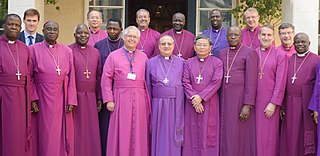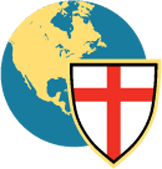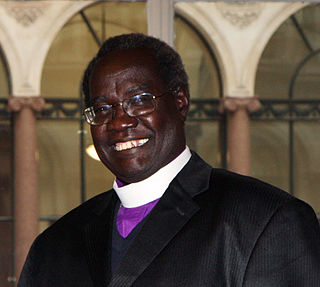
The Church of Nigeria is the Anglican church in Nigeria. It is the second-largest province in the Anglican Communion, as measured by baptised membership, after the Church of England. In 2016 it stated that its membership was “over 18 million", out of a total Nigerian population of 190 million. It is "effectively the largest province in the Communion." As measured by active membership, the Church of Nigeria has nearly 2 million active baptised members. According to a study published by Cambridge University Press in the Journal of Anglican Studies, there are between 4.94 and 11.74 million Anglicans in Nigeria. The Church of Nigeria is the largest Anglican province on the continent of Africa, accounting for 41.7% of Anglicans in Sub-Saharan Africa, and is "probably the first [largest within the Anglican Communion] in terms of active members."
The Church of the Province of West Africa is a province of the Anglican Communion, covering 17 dioceses in eight countries of West Africa, specifically in Cameroon, Cape Verde, Gambia, Ghana, Guinea, Liberia, Senegal and Sierra Leone. Ghana is the country with most dioceses, now numbering 11.
The Church of Bangladesh is a united Protestant church formed by the union of various Protestant churches in Bangladesh, principally the Anglican and Presbyterian denominations. The Church of Bangladesh is a member of the Anglican Communion and World Communion of Reformed Churches.

The Anglican Church of South America is the ecclesiastical province of the Anglican Communion that covers six dioceses in the countries of Argentina, Bolivia, Paraguay, Peru, and Uruguay.

The Anglican Church of Kenya (ACK) is a province of the Anglican Communion, and it is composed by 41 dioceses. The current Leader and Archbishop of Kenya is Jackson Ole Sapit. The Anglican Church of Kenya claims 5 million total members. According to a study published in the Journal of Anglican Studies and by Cambridge University Press, the ACK claims 5 million adherents, with no official definition of membership, with nearly 2 million officially affiliated members, and 310,000 active baptised members. The church became part of the Province of East Africa in 1960, but Kenya and Tanzania were divided into separate provinces in 1970.
The Anglican realignment is a movement among some Anglicans to align themselves under new or alternative oversight within or outside the Anglican Communion. This movement is primarily active in parts of the Episcopal Church in the United States and the Anglican Church of Canada. Two of the major events that contributed to the movement were the 2002 decision of the Diocese of New Westminster in Canada to authorise a rite of blessing for same-sex unions, and the nomination of two openly gay priests in 2003 to become bishops. Jeffrey John, an openly gay priest with a long-time partner, was appointed to be the next Bishop of Reading in the Church of England and the General Convention of the Episcopal Church ratified the election of Gene Robinson, an openly gay non-celibate man, as Bishop of New Hampshire. Jeffrey John ultimately declined the appointment due to pressure.

The Global South Fellowship of Anglican Churches (GSFA), formerly known as Global South (Anglican), is a communion of 25 Anglican churches, of which 22 are provinces of the Anglican Communion, plus the Anglican Church in North America and the Anglican Church in Brazil. The Anglican Diocese of Sydney is also officially listed as a member.

The Anglican Church in North America (ACNA) is a Christian denomination in the Anglican tradition in the United States and Canada. It also includes ten congregations in Mexico, two mission churches in Guatemala, and a missionary diocese in Cuba. Headquartered in Ambridge, Pennsylvania, the church reported 977 congregations and 124,999 members in 2022. The first archbishop of the ACNA was Robert Duncan, who was succeeded by Foley Beach in 2014.
The Global Anglican Future Conference (GAFCON) is a series of conferences of conservative Anglican bishops and leaders, the first of which was held in Jerusalem from 22 to 29 June 2008 to address the growing controversy of the divisions in the Anglican Communion, the rise of secularism, as well as concerns with HIV/AIDS and poverty. As a result of the conference, the Jerusalem Declaration was issued and the Global Fellowship of Confessing Anglicans was created. The conference participants also called for the creation of the Anglican Church in North America as an alternative to both the Episcopal Church in the United States and the Anglican Church of Canada, and declared that recognition by the Archbishop of Canterbury is not necessary to Anglican identity.
The Global Fellowship of Confessing Anglicans is a communion of conservative Anglican churches that formed in 2008 in response to ongoing theological disputes in the worldwide Anglican Communion. Conservative Anglicans met in 2008 at the Global Anglican Future Conference, creating the Jerusalem Declaration and establishing the Fellowship of Confessing Anglicans (FCA), which was rebranded as GAFCON in 2017.

Foley Thomas Beach is an American bishop. He is the second primate and archbishop of the Anglican Church in North America, a church associated with the Anglican realignment movement. Foley was elected as the church's primate on June 21, 2014. His enthronement took place on October 9, 2014. He is married to Alison and they have two adult children.

Daniel Deng Bul Yak is a South Sudanese Episcopalian bishop. He was the fourth Archbishop and Primate of the Episcopal Church of Sudan, now called Province of the Episcopal Church of South Sudan, since his enthronement on 20 April 2008 and until his retirement on 22 April 2018. He is married and has six children.

Ezekiel Kondo Kumir Kuku is a Sudanese Anglican bishop. He was the first Archbishop of the Internal Province of Sudan in the Province of the Episcopal Church of South Sudan and Sudan, since his enthronement, on 28 July 2014, until taking office as the first Archbishop and Primate of the newly created Province of the Episcopal Church of Sudan on 30 July 2017.

The Diocese of Juba is an Anglican Diocese of South Sudan, with its seat in Juba capital of South Sudan. The bishop of Juba serves as Primate of the Province of the Episcopal Church of South Sudan, and one of several Metropolitan archbishops for that church's internal provinces.
The Province of the Episcopal Church of Sudan is a province of the Anglican Communion, comprising the Sudan. It is the 39th Anglican province, created in a ceremony that took place in All Saints Cathedral, Khartoum, on 30 July 2017. The first archbishop and primate is Ezekiel Kondo.
Elizabeth Awut Ngor is a South Sudanese Anglican bishop. She serves as an assistant bishop in the Diocese of Rumbek of the Episcopal Church of South Sudan, having been consecrated a bishop on 31 December 2016 by Daniel Deng Bul, Archbishop of Juba. She is the first woman to become a bishop in a province of the Anglican Communion that aligns itself with GAFCON, a conservative Anglican movement that disapproves of homosexuality, and supports limiting women's leadership roles and their ordination.
Justin Badi Arama is a South Sudanese Episcopal bishop. He has been Bishop of the Diocese of Maridi since 2001, and was elected Archbishop and Primate of the Province of the Episcopal Church of South Sudan on 20 January 2018. His enthronement took place on 22 April 2018. He has been married to Modi Joyce since 1984, and they have four children, two boys and two girls.

The Anglican Church of Chile is the ecclesiastical province of the Anglican Communion that covers four dioceses in Chile. Formed in 2018, the province is the 40th in the Anglican Communion. The province consists of four dioceses. Its primate and metropolitan is the Archbishop of Chile, Héctor Zavala.
The fifteenth Lambeth Conference was an assembly of bishops of the Anglican Communion convened by the archbishop of Canterbury, Justin Welby, between 27 July and 7 August 2022. It was the first Lambeth Conference to be held since 2008.
The Anglican Network in Europe (ANiE) is a small Christian denomination in the Anglican tradition with churches in Europe. Formed as part of the worldwide Anglican realignment, it is a member jurisdiction of the Global Fellowship of Confessing Anglicans (GAFCON) and is under the primatial oversight of the chairman of the GAFCON Primates Council. ANiE runs in parallel with the Free Church of England (RECUK). GAFCON recognizes ANiE as a "proto-province" operating separately from the Church of England, the Scottish Episcopal Church, the Church in Wales and other Anglican Communion jurisdictions in Great Britain and the European continent. ANiE is the body hierarchically above the preexisting Anglican Mission in England; the former is the equivalent of a province whilst the latter is a convocation, the equivalent of a diocese.











